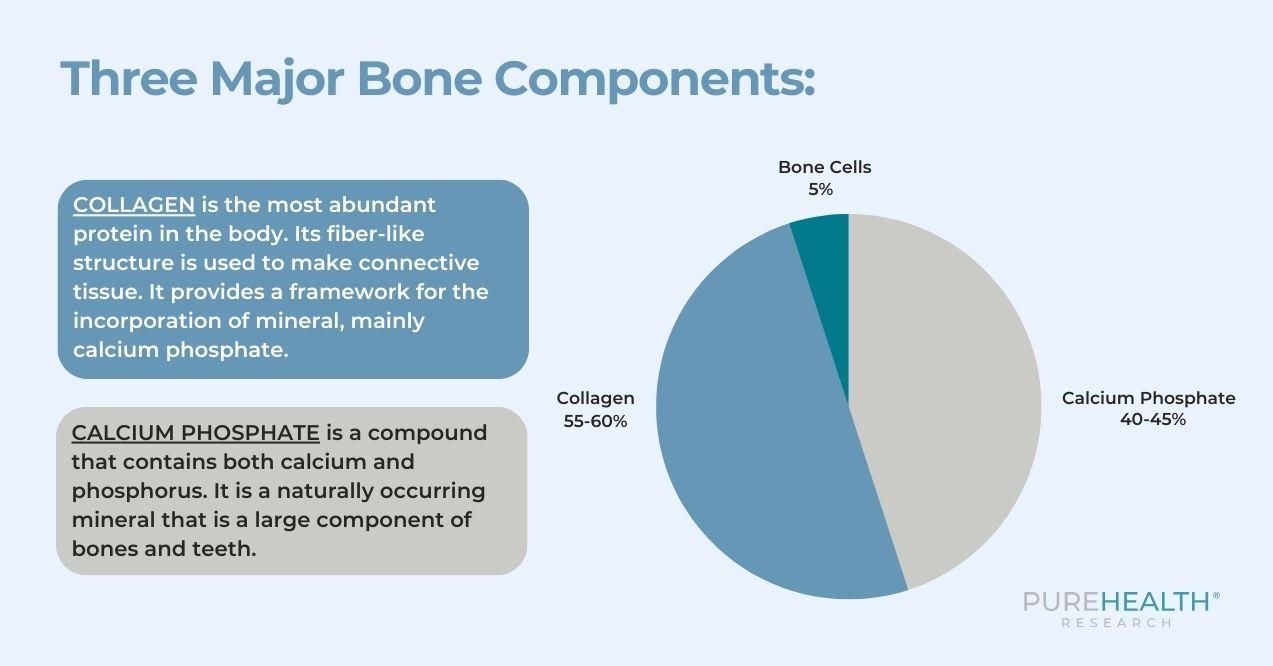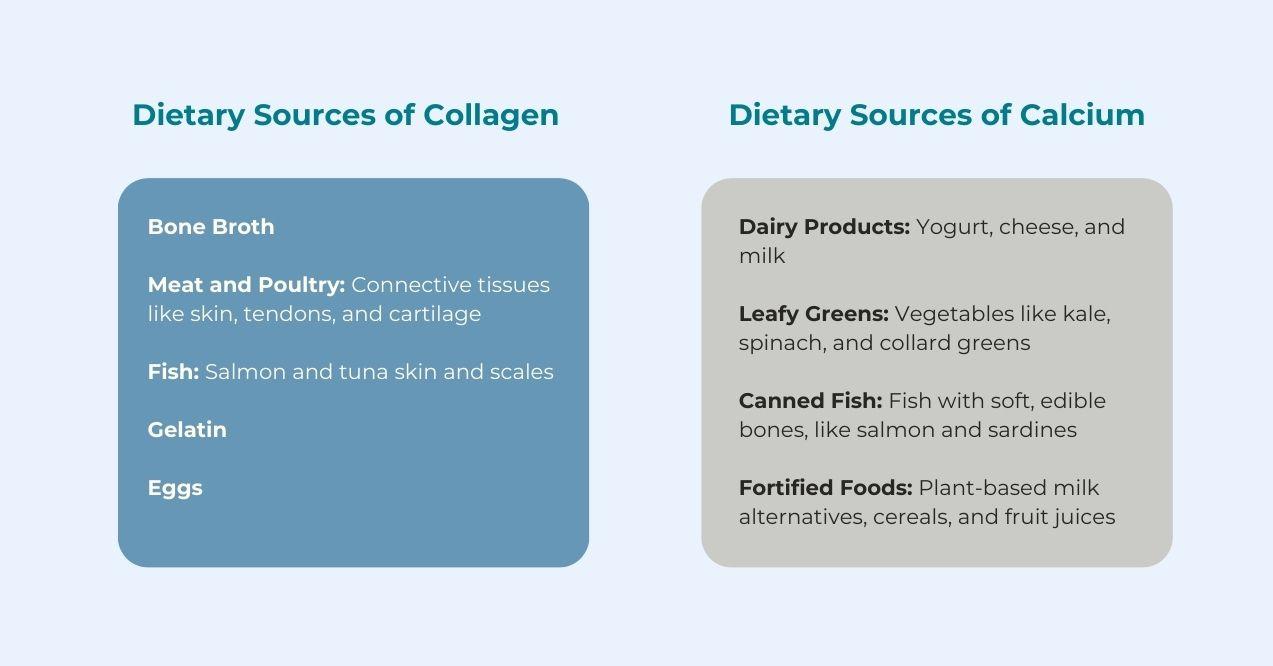Is Collagen or Calcium Better for Bones?
So, is collagen or calcium better for bones? This article's main goal is to examine the distinctive ways collagen and calcium contribute to the health of bones.


So, is collagen or calcium better for bones? Many people immediately think about calcium when it comes to having strong and healthy bones. After all, many recognize it as a crucial vitamin for the maintenance of healthy bones. However, another player in the game is becoming more well-known due to its potential advantages: collagen.
Although collagen and calcium are both necessary for healthy bones, their roles and advantages vary. Our skin, tendons, ligaments, and bones all contain the protein collagen. Our tissues benefit from its flexibility and structural support. On the other hand, calcium is a mineral essential for preserving bone strength and density.
Together, collagen and calcium maintain our bones strong and flexible. This article’s main goal is not to debate which one is superior but rather to examine the distinctive ways collagen and calcium contribute to the health of bones. After learning how they work, you may choose which nutrients to focus on in your diet or supplement regimen. In order to improve your bone health, let’s go deeper into the vital roles they play.
Bones Are Made up of Three Major Components
The three primary components of bones are calcium phosphate, collagen, and bone cells. Through the dynamic process of bone remodeling, which combines these three key elements, bone tissue is continuously renewed and repaired throughout our lifetimes.

Calcium Phosphate
Calcium phosphate makes up between 40% and 45% of the bone matrix volume, primarily in the form of hydroxyapatite crystals. It offers the stiffness and hardness required to sustain our body weight and safeguard our crucial organs. Additionally, it plays a role in various physiological processes, such as blood clotting, neuron function, and muscle contraction.
Collagen
Collagen is the second most important bone-building material. Collagen, a fibrous protein, makes up between 55% and 60% of the volume of the bone matrix. The bone structure benefits from its flexibility and strength, allowing it to tolerate bending and stretching pressures without breaking. Collagen is responsible for the bones’ distinctive mix of tenacity and adaptability, which serves as the framework for the formation of calcium phosphate crystals.
Bone Cells
The final 5% of bone tissue consists of bone cells like osteoblasts, osteocytes, and osteoclasts. Osteoblasts are in charge of creating the collagen matrix and making it easier for calcium phosphate deposit formation on the collagen framework, which strengthens bone development. Osteocytes are mature bone cells that control remodeling and repair, assisting in maintaining bone health. Contrarily, osteoclasts are special cells that degrade and absorb outdated or damaged bone tissue, enabling the remodeling and renewal of bones.
Can You Take Collagen and Calcium Supplements Together?

If you’re considering taking the best supplements for bone and joint health, you might be wondering if it’s possible to take collagen and calcium supplements together. The answer is yes, and in fact, they can complement each other in promoting optimal bone health when used appropriately. Collagen and calcium play different but interconnected roles in maintaining bone strength and integrity.
Collagen provides the structural framework and flexibility to our bones, while calcium is essential for bone density and hardness. By taking both collagen and calcium supplements, you can provide your body with the necessary building blocks to maintain bone health from multiple angles.
Collagen supplements can support collagen production, providing the foundation for bone strength and flexibility. Collagen also supports joint health, benefiting individuals experiencing joint discomfort or stiffness. On the other hand, calcium supplements can help ensure an adequate intake of this mineral, especially if your dietary calcium intake is insufficient. These supplements are particularly beneficial for individuals at risk of low bone density.
You should consider various factors while using collagen and calcium supplements together. Before taking any of them, speak with a doctor or nutritionist to determine the correct dosage and form. They can advise you on possible interactions between supplements and other prescriptions you might be taking. Second, ensure you adhere to the collagen and calcium recommendations for daily intake. Taking any in excess may not provide any additional advantages and might even have negative consequences.
How Does Taking Collagen for Your Bones Work?
The protein collagen is crucial for giving bones strength, flexibility, and support. It is a key component in the formation of bones. However, as people age, the natural production of collagen decreases. This decrease can result in lower bone density and a higher risk of fractures.
Collagen supplements help break down collagen peptides into smaller amino acids during digestion. These amino acids are subsequently absorbed by the body and distributed to different tissues, including the bones. Once absorbed, the body uses these amino acids to create new bone collagen. Taking collagen supplements can yield the following potential benefits:
- Research has shown that collagen can improve bone density and minimize the risk of fractures, especially in postmenopausal women.
- Collagen can also help maintain healthy joints, which is closely associated with overall bone health.
- Collagen supplements can increase mobility by enhancing joint health, lowering the likelihood of joint soreness or stiffness, and facilitating weight-bearing workouts that strengthen bones.
- Collagen supplements may also enhance the mechanisms through which damaged bones recover and rebuild. This protein is crucial in facilitating the development of new bone tissue, ultimately promoting bone regeneration.
It is important to note that while collagen supplements may benefit bone health, a person should not consider them a standalone solution. Achieving optimal bone health requires a comprehensive approach that comprises a well-balanced diet, regular exercise, and other lifestyle choices.
Is Collagen or Calcium Better for Bones? Lets Find Out
It is crucial to examine which nutrient is more beneficial to understand the significance of collagen and calcium for bone health. Collagen contributes to the structure and flexibility of bones, whereas calcium is necessary for density and strength. Here, we will compare the benefits and main drawbacks of both.
Benefits of Collagen
- Collagen plays a crucial role in facilitating the creation of fresh bone tissue while also boosting bone durability and suppleness.
- Taking collagen supplements has the potential to enhance bone density and lower the chances of experiencing fractures, especially for women after menopause.
- Additionally, collagen has the ability to support joint well-being, which is intricately linked to overall bone health.
- Collagen supports bone regeneration and repair processes after injury, contributing to faster recovery.
Drawback of Collagen
- Collagen supplements may not be suitable for individuals with specific allergies or sensitivities to collagen sources.
Benefits of Calcium
- Calcium is paramount to maintaining bone density and strength.
- Various physiological processes, such as muscle contraction and nerve function, depend on calcium’s vital role.
- Inhibiting low bone density and minimizing the likelihood of fractures requires adequate calcium intake.
Drawback of Calcium
- Consuming excessive calcium can lead to negative health effects, including kidney stones and cardiovascular issues.
In the end, though, which one is better? Is collagen or calcium better for bones? The answer is that both nutrients are essential and work together to support bone health. Collagen provides the structural foundation and flexibility, while calcium contributes to density and hardness. Therefore, a comprehensive approach to bone health should include both.
It’s important to consult a healthcare practitioner or nutritionist to determine the appropriate supplementation or dietary plans that suit your specific needs and health conditions. These professionals can provide highly personalized recommendations based on factors such as age, sex, and existing bone health conditions.
Dietary Sources
The best approach to obtain these necessary nutrients is by consuming natural food sources. You can integrate several of these into your diet to ensure you get enough calcium and collagen. Consider the below-listed sources for your intake needs.

Dietary Sources of Calcium
- Dairy Products: Yogurt, cheese, and milk are all superb options for calcium. Go for low-fat or non-fat options to reduce saturated fat intake.
- Leafy Greens: Vegetables like kale, spinach, and collard greens are not only rich in calcium but also provide additional vitamins and minerals.
- Canned Fish: Fish with soft, edible bones, like salmon and sardines, are great calcium sources.
- Fortified Foods: Many food products like plant-based milk alternatives, cereals, and fruit juices are calcium-fortified.
Dietary Sources of Collagen
- Bone Broth: This source comes from simmering animal bones and connective tissues, resulting in a naturally rich collagen mix.
- Meat and Poultry: Animal proteins, particularly cuts with connective tissues like skin, tendons, and cartilage, contain collagen.
- Fish: Some fish, such as salmon and tuna, contain collagen in their skin and scales
- Gelatin: Derived from collagen-rich animal tissues, gelatin is a common ingredient in desserts, gummies, and jelly.
- Eggs: Egg whites contain a small amount of collagen.
- Plant-Based Sources: Plant-based sources do not directly provide collagen but support collagen production. Foods abundant in vitamin C, like citrus fruits, strawberries, and bell peppers, aid in collagen synthesis.
Incorporating organic food sources into one’s meals can provide a balanced and healthy intake of collagen and calcium. It is important to prioritize a diverse and nutrient-rich diet in order to promote overall bone health and well-being.
Consider Using Supplements
Supplements can serve as a convenient and effective way to promote optimal bone health. One such supplement is the Bone Health Formula from PureHealth Research. This rich formula packs all the vital nutrients to stimulate and maintain healthy, strong bones.
The essential ingredients of the formula include magnesium, zinc, calcium citrate, manganese, and potassium. Magnesium plays a critical role in regulating calcium levels in the body and supports the maintenance of strong cartilage, which ultimately enhances bone strength. Zinc helps inhibit bone loss and aids in producing proteins that effectively preserve bone mass.
Calcium citrate, known for its exceptional absorption capabilities, is a precious source of calcium that greatly benefits bone health by providing a fundamental component for healthy bones. The presence of manganese effectively enhances bone density and stimulates the generation of fresh bone growth. Furthermore, potassium aids in countering the acidic substances responsible for removing calcium from the body, ultimately leading to improved bone density.
One should consume this supplement in a daily dosage of five (5) capsules, accompanied by at least 8 oz of liquid. It is vital to adhere to and refrain from exceeding the recommended dosage. Those taking blood thinners should avoid the supplement due to its vitamin K content. Pregnant or nursing mothers, children under 18, and individuals with known medical conditions should consult a physician before incorporating any dietary supplement into their regimen.
Dr. Holly Lucille, a highly respected professional, recommends the Bone Health Formula as a supplement packed with the vital nutrients needed to stimulate and maintain healthy, strong bones. Incorporating this formula into your daily regimen, alongside a balanced diet and lifestyle, can provide valuable support for your bone health journey.
Key Thoughts
So, is collagen or calcium better for bones? As you can see, the significance of both in supporting our bones’ proper development and maintenance is high. These nutrients have a paramount role in our bodies that cannot be questioned. To better understand the main points discussed in this article, consider the following key thoughts:
- Both collagen and calcium play vital roles in maintaining bone health. Collagen provides the structural framework and flexibility, while calcium contributes to density and hardness.
- Collagen supplements can enhance collagen production in the body, supporting bone flexibility.
- Calcium supplements can help ensure an adequate intake of this essential mineral to promote bone strength.
- Bone broth, meat, fish, and gelatin are natural dietary sources of collagen.
- Various sources of calcium exist, including dairy products, leafy greens, and fortified foods.
- Supplements like the Bone Health Formula from PureHealth Research can provide a convenient way to support bone health by delivering essential nutrients.
- Following recommended dosages and consulting with a healthcare practitioner if needed is essential when considering supplements.
Collagen supplements can strengthen bone density as well, especially in postmenopausal women. They enhance collagen production, which is vital for bone strength.
It’s important to consult with a healthcare professional before taking calcium supplements alongside other certain medications. They can provide guidance on safe consumption based on your specific situation.
The results of bone supplements can vary depending on individual factors such as overall health, age, and lifestyle. Individuals should consistently follow the supplement’s instructions and give time for the body to absorb and utilize the nutrients effectively. Combining them with a well-rounded approach to bone health, including an appropriate diet and frequent exercise, is also important for optimal results. Patience and consistency are paramount when it comes to seeing the potential benefits of bone supplements.
Sign up for our Healthy Living newsletter!
Advertisement. This site offers health, wellness, fitness and nutritional information and is designed for educational purposes only. You should not rely on this information as a substitute for, nor does it replace, professional medical advice, diagnosis, or treatment. If you have any concerns or questions about your health, you should always consult with a physician or other health-care professional. Do not disregard, avoid or delay obtaining medical or health related advice from your health-care professional because of something you may have read on this site. The use of any information provided on this site is solely at your own risk.











